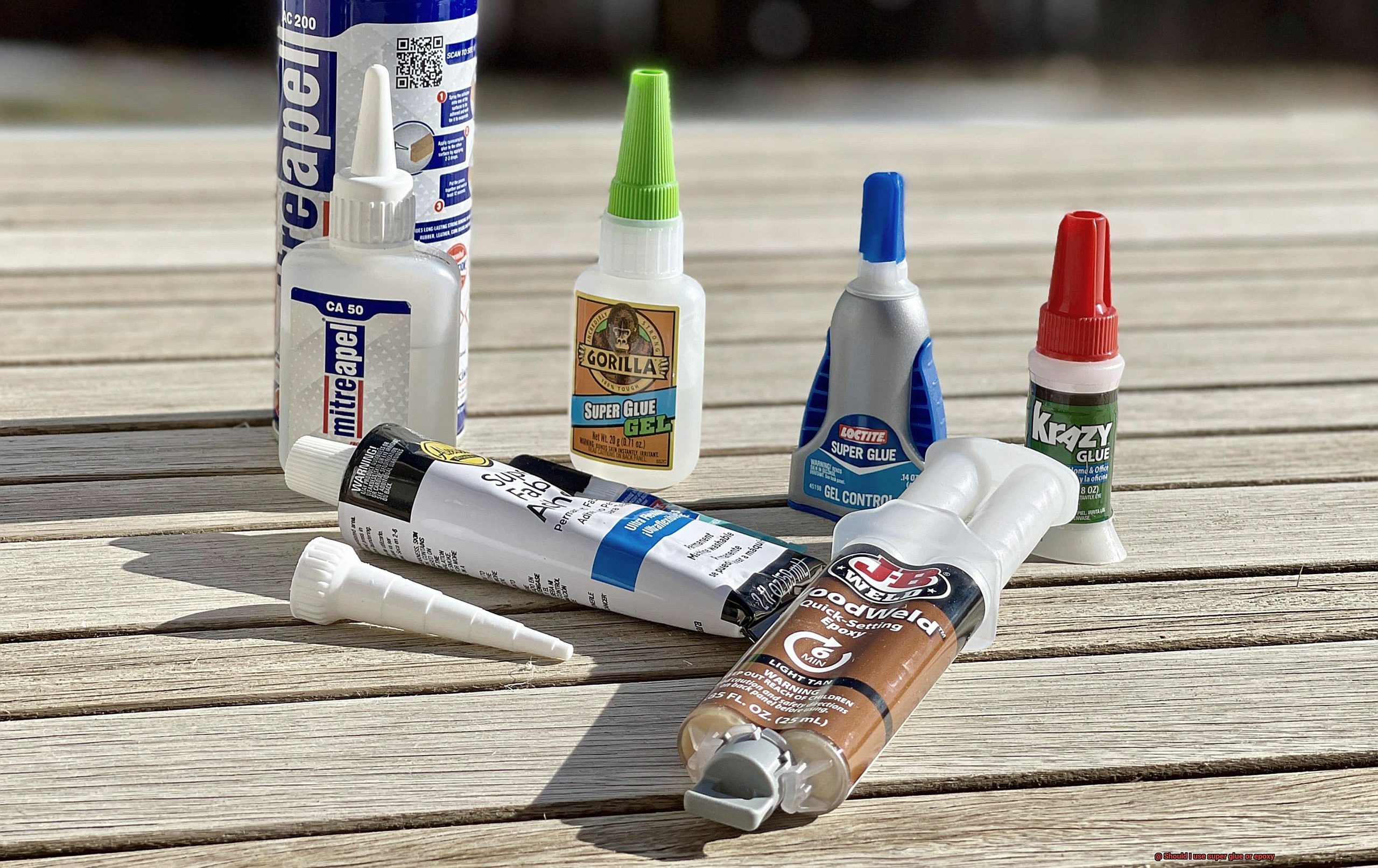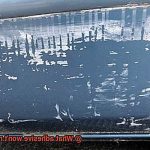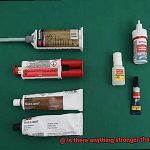Are you feeling stuck trying to figure out which adhesive to use for your DIY project? The decision between super glue and epoxy can be overwhelming, leaving you scratching your head. But fear not, my friend. Adhesives may seem like a daunting world, but we’re here to help you navigate it.
Super glue and epoxy are two of the most versatile adhesives in the market. They’re popularly used for crafting, woodworking, and even automotive repairs. While both offer quick bonding solutions, there are crucial differences that you need to consider before making your choice.
In this blog post, we’ll take a deep dive into the world of adhesives and compare super glue and epoxy head-to-head. We’ll weigh the pros and cons of each option so that you can make an informed decision without any mishaps. From the speed of drying to the strength of the bond, we’ll explore all factors worth considering.
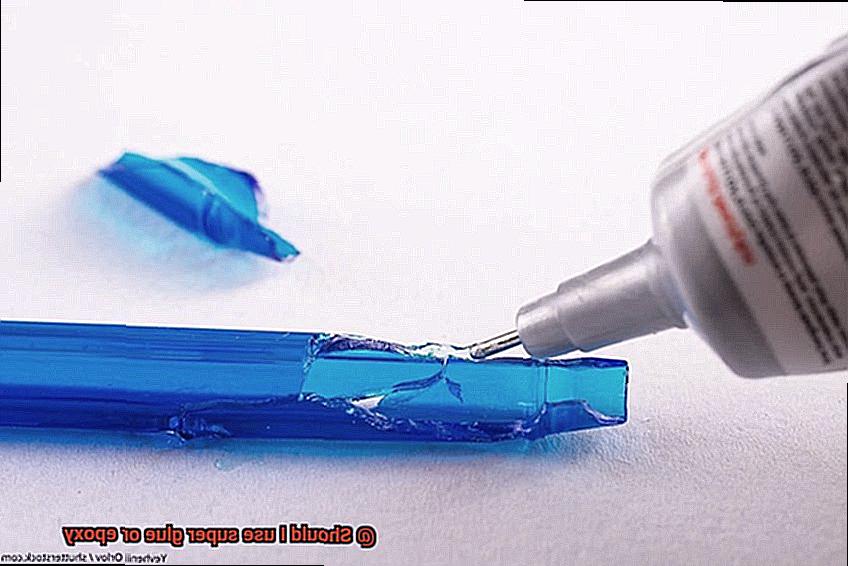
Whether you’re tackling a small project or a major one, this post is a must-read. You’ll become an adhesive expert in no time with all the knowledge needed to make the right choice.
What is Super Glue?
Contents
Super glue, also known as cyanoacrylate adhesive, is a miracle worker in the world of adhesives. This strong and fast-acting adhesive has become a popular choice for both household and industrial applications. Its secret lies in the main ingredient, ethyl cyanoacrylate, which is a type of acrylic resin that forms a strong bond when it comes into contact with moisture.
Super glue is well-known for its ability to bond quickly and securely to a variety of surfaces, including plastics, metals, ceramics, and wood. This makes it an almost indispensable tool for small repairs or projects that require a quick fix. The glue dries within seconds, creating a strong and permanent bond that can withstand harsh environments and extreme temperatures.
However, the fast-drying property of super glue can also be its downfall if not applied carefully. It’s important to take caution when using super glue as it can easily bond skin together within seconds. So, be sure to avoid skin contact and use it in a well-ventilated area.
It’s important to note that while super glue is versatile and reliable, it may not be the best choice for all situations. For instance, it may not form a strong bond on porous surfaces such as wood. In such situations, epoxy may be a better alternative.
Epoxy is a two-part adhesive that consists of a resin and hardener. When mixed together, they form a strong bond that is resistant to water and chemicals. Epoxy is ideal for larger projects or repairs that require a stronger bond and works well on porous surfaces such as wood.
What is Epoxy?
Then let’s explore the wonder of epoxy.
Epoxy is a two-part adhesive made up of resin and hardener. When mixed together, they create a chemical reaction that generates a robust bond. This adhesive is used in diverse applications due to its adaptability and tenacity.
Let’s delve deeper into the sub-topics related to epoxy:
- Versatility: Epoxy can be used on an extensive range of surfaces, including metal, wood, plastic, and glass. It is also utilized in different industries such as automotive, construction, and marine.
- Strength: Epoxy’s durability and strength are unmatched. It can withstand extreme temperatures and harsh conditions, making it ideal for industrial settings.
- Resistance: Epoxy is resistant to water and chemicals, making it suitable for projects exposed to these elements. It can also seal surfaces and fill gaps or cracks.
- Application: Using epoxy requires careful attention to detail. The surface must be clean and dry before application, and the resin and hardener must be mixed in the correct proportions. Epoxy takes several hours to dry and cure fully, so patience is key.
Advantages of Super Glue
Whether you’re working on a fast-paced project or need a quick repair, super glue is the answer. As an expert in this area, I’m here to tell you about the many advantages of using super glue.
First and foremost, super glue is incredibly fast-drying. In fact, it dries within seconds of application, making it perfect for those times when you need to get a project or repair done quickly. No more waiting around for hours for the adhesive to set – with super glue, you can move on to other tasks in no time.
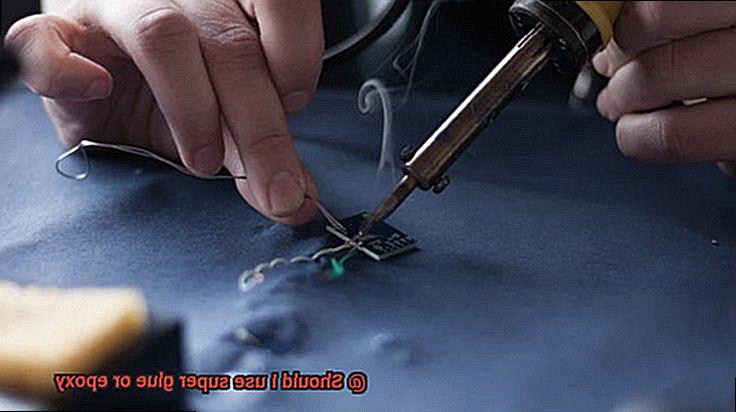
But quick-drying isn’t the only thing super glue has going for it. One of the most significant advantages of super glue is its strength. Once it bonds two surfaces together, it forms an unbreakable bond that can withstand significant stress and pressure. This makes it ideal for bonding materials that will be exposed to constant wear and tear, such as metal, plastic, or ceramic.
Versatility is another key advantage of super glue. It can be used on a wide variety of surfaces including wood, metal, plastic, ceramic, glass and rubber. Plus, it’s water-resistant which makes it perfect for repairs in wet environments such as bathrooms or kitchens.
Using super glue is also incredibly simple – just apply a small amount of glue on one surface and press the two surfaces together firmly for a few seconds. The adhesive sets very quickly and forms an almost instant bond. So even if you don’t consider yourself particularly handy or skilled at DIY projects, you can still use super glue with ease.
Finally, super glue comes in different forms such as liquid, gel or spray which makes it easier to apply depending on your project requirements. Whether you need to bond something delicate or something heavy-duty, there’s a form of super glue that can help you get the job done.
But before you dive in and start using super glue for all your projects, it’s important to note that it may not be the best choice for all types of materials or situations. Always consider the specific requirements of your project before deciding on whether to use super glue or epoxy.
Advantages of Epoxy
This adhesive is a top choice for bonding, sealing, and filling gaps due to its strength, durability, and versatility. When considering adhesives for your next project, the benefits of epoxy over other types, such as super glue, are numerous.
Firstly, epoxy is incredibly strong and can bond to almost any surface. Whether it’s metal, wood, concrete, or plastic, epoxy provides a powerful hold that is essential for industrial applications.
Secondly, epoxy’s resistance to water and chemicals make it ideal for use in environments exposed to moisture or corrosive substances. It’s the go-to adhesive for marine environments, chemical plants, and other settings where other adhesives would fail.
Another advantage of epoxy is its versatility. It’s an all-in-one adhesive that can be used for bonding, sealing, filling gaps, and even as a coating. This makes it a fantastic choice for both DIY projects and professional applications.
Additionally, epoxy has an impressive shelf life and can last for years without losing its effectiveness. This means you can buy larger quantities without worrying about it going bad before you have a chance to use it.
Finally, epoxy can be tinted or colored to match the surface you are bonding or coating. This feature is particularly useful for decorative or aesthetic purposes.
Disadvantages of Super Glue
Its quick and robust bonding properties have made it a popular choice for many projects. However, before you reach for that tube of super glue again, let’s take a closer look at its downsides.
Firstly, let’s talk about brittleness. While super glue creates a strong bond, the bond can become brittle over time, especially when exposed to heat or moisture. This makes it risky to use in high-stress areas or to hold heavy objects. One wrong move, and the bond could break easily, which could be dangerous.
Secondly, super glue may not work well on all materials. It works best on non-porous surfaces like metal, plastic, or glass, but porous materials like wood or fabric are not suitable for super glue. The adhesive cannot penetrate the material’s surface to create a strong bond, making it ineffective. This means that if you’re working with porous materials, you’ll need to use a different adhesive.
Moreover, removing super glue can be challenging once applied. If it accidentally gets on your skin or other surfaces, it can be difficult to remove without causing skin irritation or damage to the surface. Acetone can dissolve the glue, but it may not always work effectively.
Lastly, super glue has a short shelf life once opened. Once the container is open, the adhesive can start to dry out and become less effective over time. Even if there’s some adhesive left in the container, it may no longer work correctly. So always check the expiration dates before use.
Disadvantages of Epoxy
Epoxy can be an excellent adhesive for various projects, but it also has a few disadvantages that should be taken into account before use. Firstly, the long curing time of at least 24 hours may not be ideal for projects that require a quick fix. Moreover, over time, epoxy can become brittle and prone to cracks and breakage, making it less durable.
Temperature and humidity also play a critical role in the effectiveness of epoxy. High temperatures can cause it to soften and become pliable, while low temperatures can make it rigid and brittle. This can make it challenging to use in outdoor or fluctuating environments.
Furthermore, working with epoxy can be a bit tricky because it requires precise mixing of its two parts. Any mistakes in the mixing process can lead to an improper bond that won’t hold up over time. Additionally, the mixing process can be messy and time-consuming.
Lastly, it’s essential to handle epoxy with care because it contains chemicals that can cause skin irritation, respiratory issues, and other health problems if not used correctly with protective gear in a well-ventilated area.
When to Use Super Glue
Super glue, also known as cyanoacrylate adhesive, is the answer to your prayers. This fast-drying and strong adhesive is perfect for small and quick fixes, making it a must-have in any DIY toolkit.
Super glue is particularly useful when working with materials such as plastic, metal, or rubber. It can easily handle outdoor projects too, thanks to its water-resistant properties. This makes it an excellent option for repairing broken items or attaching small pieces together.
One of the main advantages of using super glue is its quick bonding time. It dries in seconds and can hold up to 2,000 psi, making it incredibly strong. Its precision applicator tip allows for easy application in tight spaces, making it perfect for fixing small cracks or gaps in materials.
However, it’s worth noting that super glue may not be the best option for projects that require flexibility or stress resistance. In these instances, epoxy may be a better choice.
When using super glue, it’s important to take safety precautions such as wearing gloves and eye protection. And remember to use it in a well-ventilated area too.
When to Use Epoxy
This two-part adhesive is made up of resin and hardener and is perfect for use on surfaces such as metal, wood, ceramics, and plastic.
But when should you use epoxy over other adhesives like super glue? Here are some sub-topics to help you understand when to use epoxy as an adhesive:
- Bonding dissimilar materials: One of the primary advantages of using epoxy over super glue is its ability to bond dissimilar materials. Unlike super glue, which works best on surfaces that are similar or identical, epoxy can bond materials such as metal to wood or plastic to ceramic. This makes it a versatile adhesive that can be used in a wide range of applications.
- Waterproof and resistant to chemicals: Epoxy is also waterproof and resistant to chemicals, making it an excellent choice for applications where the adhesive will be exposed to moisture or chemicals. This makes it ideal for use in marine applications, as well as in automotive and industrial settings.
- Curing in a variety of conditions: Another advantage of using epoxy over super glue is its ability to cure in a variety of conditions. Epoxy can be used in both hot and cold temperatures, and it can even cure underwater. This makes it a reliable adhesive that can be used in almost any environment.
So, when should you choose epoxy over other adhesives? If the application requires a strong, durable bond between dissimilar materials or will be exposed to moisture or chemicals, then epoxy is likely the better option. However, if the application requires a quick fix for a small crack or gap between similar materials, then super glue may be sufficient.
Also Read: Best Glue for Legos
Conclusion
In conclusion, deciding whether to use super glue or epoxy can be overwhelming. However, knowing their unique strengths and limitations can help you make an informed decision.
For small repairs or quick fixes, super glue is the go-to adhesive due to its fast-drying and robust bonding properties. It works best on non-porous surfaces like metal, plastic, or glass and is water-resistant. This makes it a great choice for fixing items in wet environments like bathrooms or kitchens. However, it may not hold up well under high-stress situations or with heavy objects.
If you need an adhesive that provides a powerful hold for industrial applications, then epoxy is your best bet. As a two-part adhesive, it bonds exceptionally well to almost any surface – even dissimilar materials such as metal to wood or plastic to ceramic. Epoxy is also waterproof and resistant to chemicals, making it ideal for marine, automotive, and industrial applications.
Ultimately, when choosing between super glue and epoxy, consider your project’s specific needs. If you require a quick fix for small cracks or gaps between similar materials, super glue will do the trick. But if you need a strong bond between dissimilar materials or exposure to moisture or chemicals, then epoxy is your better option.

